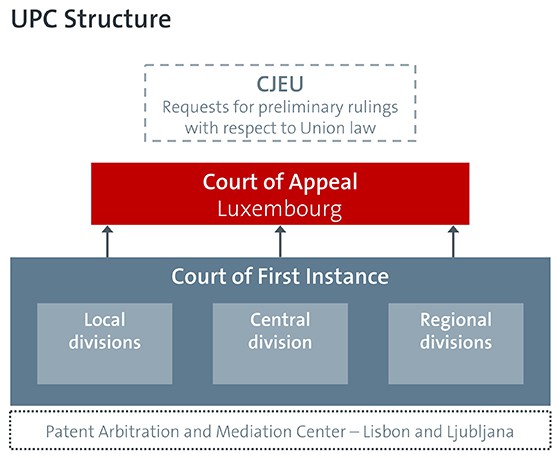Unitary Patent Court
The Unified Patent Court (UPC) is an international court set up by 25 of the participating Member States to deal with the infringement and validity of both Unitary Patents and European patents. Its rulings will apply in all Member States that have ratified the Agreement on a Unified Patent Court (UPC Agreement).
The Unified Patent Court is exclusively competent in disputes relating to Unitary Patents and European patents (only for EU countries), even European patents which were granted before the Agreement on a Unified Patent Court come into force.
For a European patent there is the option - so long as it is not pending at the Unified Patent Court - to choose the national court instead of the Unified Patent Court (Opt-Out). An Opt-out needs to be declared. An Opt-out may be withdrawn (Opt-in). Opt-out and Opt-in options are timely limited (currently 7 years, respective further upto 7 years).
Structure and Benefits

The UPC will comprise a Court of First Instance, a Court of Appeal and a Registry. The Court of First Instance will be composed of a central division (with its seat in Paris and a section in Munich) and several local and regional divisions. The Court of Appeal will be located in Luxembourg.
The UPC will provide a better framework for all parties involved in patent litigation in Europe. In particular, costs will be reduced as parties will not need to engage in parallel patent litigation in different member states. Diverging decisions from different national courts on infringement and validity of the same patent will cease as the UPC develops a truly European case law, thus enhancing legal certainty for all users. Over time, a more efficient and balanced patent litigation system will emerge, to the benefit of both patent proprietors and third parties, namely:
- for patent proprietors, the UPC will offer better enforcement of valid patents, with Europe-wide effects of decisions, injunctions and damages;
- for third parties and the public, the UPC will provide a central revocation action, separate from the EPO's opposition procedure, at any time during the life of the patent.